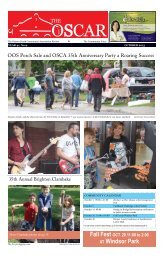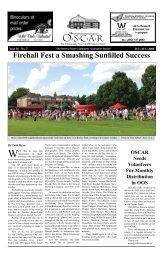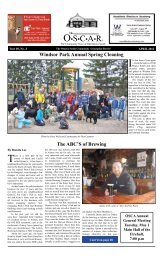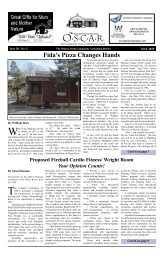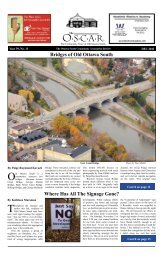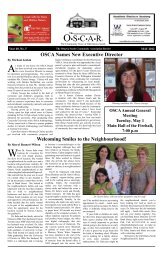O•S•C•A•R© Shop Your Local! - Old Ottawa South
O•S•C•A•R© Shop Your Local! - Old Ottawa South
O•S•C•A•R© Shop Your Local! - Old Ottawa South
You also want an ePaper? Increase the reach of your titles
YUMPU automatically turns print PDFs into web optimized ePapers that Google loves.
Page 36<br />
by Rick Sutherland, CLU,<br />
CFP, FDS, R.F.P<br />
The Federal Government has<br />
given Canadians a special<br />
Christmas gift this year.<br />
Starting January 2009 all Canadian<br />
residents, age 18 and older, are<br />
eligible to open a Tax Free Savings<br />
Account (TFSA). The account allows<br />
a maximum contribution of $5,000<br />
per year to be saved and sheltered<br />
from tax.<br />
Although there are similarities to<br />
the Registered Retirement Savings<br />
Plan (RRSP) the TFSA differs in<br />
many respects. RRSPs are specifically<br />
designed as a long-term retirement<br />
savings vehicle. RRSPs should not be<br />
used for short- to mid-term expenses<br />
due to the loss of contribution room<br />
and full taxation of withdrawals,<br />
whereas the TFSA can be withdrawn<br />
Financial Divorce Specialist<br />
Avoid costly mistakes with professional financial<br />
assistance in the division of assets.<br />
Contact: Rick Sutherland, CLU, CFP, FDS, R.F.P.<br />
1276 Wellington Street, <strong>Ottawa</strong> ON K1Y 3A7<br />
Phone: (613)798-2421 Email: rick@invested-interest.ca<br />
To book an OSCAR ad<br />
call Gayle 730-1058<br />
oscarads@oldottawasouth.ca<br />
Guidance, Protection<br />
and Peace of Mind.<br />
Anna E. Sundin, Barrister & Solicitor<br />
GEnErAl PrActicE includinG:<br />
Family Law, Wills, Real Estate, Incorporations, Litigation and Collaborative Family Law<br />
– A Cooperative and Dignified Approach to Separation and Divorce.–<br />
The OSCAR - OUR 36 th YEAR DEC 2008<br />
<strong>Your</strong> Gift From the Government<br />
at any time without restriction or<br />
tax consequences and used for any<br />
purpose.<br />
Both RRSPs and the TFSA<br />
offer tax advantages with distinct<br />
differences. Contributions to a RRSP<br />
are tax deductible and reduce your<br />
income for tax purposes. In contrast,<br />
your TFSA contributions are not tax<br />
deductible. Both accounts will grow<br />
tax-free.<br />
Withdrawals from your RRSP<br />
are added to your income and taxed<br />
at current income tax rates. However,<br />
your TFSA withdrawals are not<br />
subject to tax. The capital and growth<br />
of a TFSA are withdrawn tax-free.<br />
The amount you withdraw can<br />
be put back into your TFSA without<br />
affecting your future contribution<br />
room. If you withdraw $5,000 in 2009,<br />
then your contribution limit for 2010<br />
will be $10,000. The only restriction<br />
is that you cannot re-contribute in the<br />
year that you make your withdrawal.<br />
You must wait until the following<br />
year. Another important note is that<br />
neither income earned nor withdrawal<br />
of capital from a TFSA will affect<br />
your eligibility for federal incometested<br />
benefits and credits such as the<br />
Guaranteed Income Supplement, the<br />
Canada Child Tax Benefit the GST<br />
credit or <strong>Old</strong> Age Security benefits.<br />
You do not lose your TFSA<br />
contribution room if you do not<br />
contribute up to the limit in any given<br />
year. <strong>Your</strong> unused contribution room<br />
is carried forward to the next year<br />
and indefinitely. So if you contribute<br />
$3,000 in 2009 then your contribution<br />
limit is $7,000 in 2010.<br />
The TFSA is anticipated to be<br />
a great new tax-sheltered account<br />
to help Canadians achieve their<br />
personal goals. With this program the<br />
By Anna Sundin<br />
government is encouraging Canadians<br />
to save rather than use debt - whether<br />
for a car, a vacation, home renovations,<br />
or a small business start-up. Talk to<br />
your financial advisor about the best<br />
strategies and options for you utilize<br />
this gift in 2009 and beyond.<br />
The foregoing is for general<br />
information purposes and is the<br />
opinion of the writer. This information<br />
is not intended to provide personal<br />
advice including, without limitation,<br />
investment, financial, legal, accounting<br />
or tax advice. Please call or write to<br />
Rick Sutherland CLU, CFP, FDS,<br />
R.F.P., of FundEX Investments Inc. to<br />
discuss your particular circumstances<br />
or suggest a topic for future articles<br />
at 613-798-2421 or E-mail rick@<br />
invested-interest.ca.<br />
The Role of Surveys in<br />
Real Estate Transactions<br />
Title insurance is often helpful to a purchaser of real estate. It does not<br />
mean, however, that a building location survey is unnecessary.<br />
Title insurance is an insurance policy bought at the time of the purchase<br />
of real estate which protects the home owner and often the mortgage lender<br />
against losses incurred as a result of unknown title defects for as long as the<br />
home owner owns the home. The kinds of losses that are usually covered<br />
are errors in title registration, encroachments on property, construction liens,<br />
unpaid realty taxes, lack of access and title fraud.<br />
A building location survey is prepared by a qualified surveyor who<br />
attends at the property, reviews the visible boundary markers and the actual<br />
use the owner and the neighbours make of the land and also reviews all<br />
relevant title documents registered in the registry office. If there are any<br />
conflicts revealed by this investigation, the surveyor notes them on the<br />
survey, which is a drawing of the land with all the boundaries and buildings<br />
noted on it. A survey is a guarantee of the extent of the owner’s title at the<br />
time of the survey.<br />
The lawyer then conducts his or her own searches and as a result,<br />
guarantees the quality of the title to the lands to the purchaser. However,<br />
where information is missing or searches cannot be conducted or are not<br />
conducted by the real estate lawyer there is a gap in the guarantee the lawyer<br />
can give to the purchaser with respect to the quality of title to the property.<br />
Title insurance is often used by the purchaser instead of having these<br />
searches conducted. If there is a problem revealed afterwards as a result<br />
of searches that were not conducted, the policy will pay the owner and/or<br />
mortgage holder the cost of repairing the defect that later comes to light.<br />
However, that may not be satisfactory to the purchaser. A building<br />
location survey could have revealed these kinds of issues before the closing<br />
took place and the prospective purchaser could have decided whether or not<br />
to complete the transaction as a result.<br />
For example, if it is discovered that an encroachment onto public lands<br />
by a building like a garage has to be removed and the title insurance company<br />
pays to have the building removed, that does not help the purchaser who<br />
now does not have the garage they thought they bought with the property.<br />
Title insurance does not necessarily cover the cost of building a new garage.<br />
If the lot is too small to build a new garage that complies with current zoning<br />
by-laws, the purchaser will not have obtained what they thought they were<br />
buying.<br />
There have been many court cases that could have been avoided if there<br />
had been an up to date building location survey provided by the vendor. For<br />
example: a builder who built on the wrong lot, purchasers who were not<br />
entitled to an adjoining garage and laneway they thought were included,<br />
a lot 10 feet narrower than the purchaser had thought, a cottage located<br />
95% on someone else’s land, and a sewer easement that interfered with the<br />
purchasers’ building plans.



